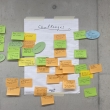Making STEAM education more exciting with citizen science.
9. Apr. 2024
“How to include schools in science health studies: practical experiences and lessons learned?” was the topic of a workshop organised by ZSI (Centre for Social Innovation www.zsi.at) at the European Citizen Science Conference in Vienna in April 2024.
Together with the 31 participants from schools, science, pedagogy, and medical research Teresa Schäfer, Claudia Magdalena Fabian, Barbara Kieslinger and Elisabeth Unterfrauner facilitated lively discussions on the challenges encountered when conducting citizen science activities in schools and the identification of practical solutions aimed at overcoming these challenges.
STEM and STEAM education are gaining increasingly significance in science education and educational policies throughout Europe. These approaches aim to equip young learners with relevant skills and knowledge to tackle global challenges effectively. While traditional STEM education encompasses science, technology, engineering, and mathematics, the addition of the “A” in “STEAM” incorporates artistic elements such as creative thinking and applied arts.
Despite this expansion, educators often encounter difficulties in engaging students, particularly in subjects like statistics, biology, and chemistry. Integrating citizen science activities into project-based learning could serve as a valuable tool in igniting student’s interest in these subjects. Such initiatives may even inspire students to pursue academic careers in these fields.
By intertwining science subjects, arts, and citizen science activities, educators can facilitate not only the transfer of knowledge but also foster a deeper understanding of the interdisciplinary connections between different subjects. This approach encourages students to apply their learning to real-world problems, reinforcing the relevance and applicability of their education.
But when researchers approach schools to collaboratively conduct scientific studies together with pupils they face challenges like the motivation of schools to participate, the adaption of the scientific work to school curricula and given circumstances, like availability of time and resources. Also, ethical challenges have been raised in the workshop, especially when it comes to conducting health research with minors.
All the collected practical experiences and ways to address these challenges will be summarized in the coming weeks by the workshop organisers and shared within the citizen science community.
If you want to stay in contact with us and learn from the workshop outcomes, please contact schaefer@zsi.at.
We want to thank the two European projects InChildHealth (https://inchildhealth.eu/) and RoadSTEAMer (www.road-steamer.eu) and the 31 active participants who supported the great outcomes of the workshop.
Author: Claudia Magdalena Fabian, Teresa Schäfer, Elisabeth Unterfrauner
Related Articles:
- Publication: How to include schools in citizen science health studies: Practical experiences and lessons learned
Tags: citizen science, STEAM, STEM















































